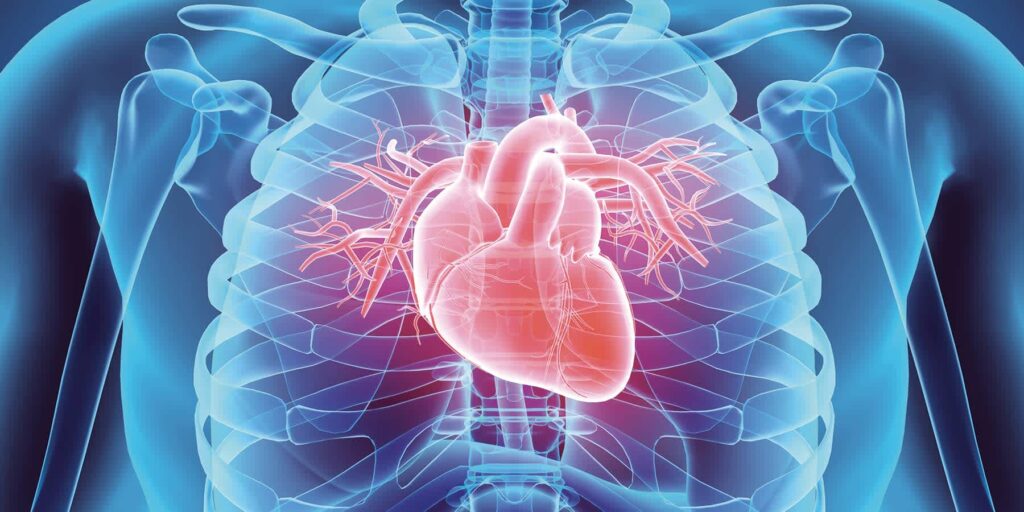Heart disease continues to be a major cause of death globally, but the positive news is that many of its risk factors can be controlled or prevented. By making healthy lifestyle choices, individuals can significantly lower their chances of developing heart disease.
Key risk factors for heart disease include high blood pressure, high cholesterol, smoking, poor diet, lack of physical activity, and stress. Addressing these through changes like eating a balanced diet, staying active, quitting smoking, and managing stress can have a major impact on heart health.
Taking steps such as regular exercise, a heart-healthy diet, and regular check-ups with your healthcare provider can improve overall cardiovascular health. Small, consistent changes over time can lead to significant long-term benefits for your heart.
Understanding Heart Disease

Heart disease refers to a range of conditions that impact the heart’s structure and function. These include coronary artery disease, heart attacks, heart failure, arrhythmias, and valvular heart diseases. The most common type is coronary artery disease, which happens when the blood vessels that supply the heart become narrowed or blocked due to plaque buildup, a condition known as atherosclerosis.
Heart disease prevention is key to reducing the risk of these conditions. By making healthy lifestyle choices, such as maintaining a balanced diet, staying active, managing stress, and avoiding smoking, you can significantly lower your risk. Taking these preventive steps helps keep the heart healthy and reduces the likelihood of developing serious cardiovascular issues.
Risk Factors for Heart Disease
While some risk factors like age, gender, and family history cannot be controlled, many others can be managed:
High Blood Pressure (Hypertension): Hypertension increases the heart’s workload by making it harder for blood to flow through the arteries. Over time, this constant pressure can damage the arteries, leading to a higher risk of heart disease. Heart disease prevention involves managing blood pressure through lifestyle changes such as regular exercise, a low-sodium diet, and stress management.
High Cholesterol: High levels of LDL (“bad” cholesterol) can cause plaque to form in the arteries, narrowing them and restricting blood flow to the heart. This increases the risk of heart attacks and strokes. Heart disease prevention includes maintaining healthy cholesterol levels by eating a diet rich in fruits, vegetables, and healthy fats, while limiting processed foods.
Diabetes: Poorly controlled blood sugar levels can cause damage to blood vessels and increase the risk of developing heart disease. Managing diabetes through proper diet, exercise, and medication is a crucial part of heart disease prevention.
Obesity: Excess weight puts extra strain on the heart and is often linked with other risk factors like high blood pressure and high cholesterol. Losing weight and maintaining a healthy body mass index (BMI) are important steps in preventing heart disease.
Physical Inactivity: A lack of exercise contributes to weight gain, high blood pressure, and other heart disease risk factors. Engaging in regular physical activity, like walking or swimming, can improve heart health and help with heart disease prevention.
Smoking: Smoking damages blood vessels, reduces the oxygen levels in the blood, and increases the risk of heart disease. Quitting smoking is one of the most effective ways to reduce the risk of cardiovascular problems and improve overall heart health.
Excessive Alcohol Consumption: Drinking too much alcohol can raise blood pressure and add unnecessary calories to your diet, leading to weight gain. Limiting alcohol intake can help prevent high blood pressure and contribute to heart disease prevention.
Poor Diet: A diet high in saturated fats, trans fats, and sodium can raise cholesterol and blood pressure levels. Eating a balanced diet, rich in whole grains, lean proteins, and healthy fats, is essential for heart disease prevention.
Chronic Stress: Chronic stress can lead to high blood pressure and unhealthy coping mechanisms, such as overeating or smoking. Managing stress through relaxation techniques, mindfulness, and regular physical activity is important for preventing heart disease.
Top 10 Strategies for Heart Disease Prevention
Adopt a Heart-Healthy Diet
A nutritious diet plays a crucial role in heart disease prevention. Eating a balanced diet, rich in fruits, vegetables, whole grains, and lean proteins, helps maintain healthy cholesterol levels and blood pressure. Consuming healthy fats, such as those found in nuts, seeds, and fish, supports cardiovascular health, while limiting unhealthy fats, sodium, and processed foods can reduce the risk of heart disease.

Including heart-healthy foods into your daily meals can also aid in weight management, reducing the strain on your heart. A nutritious diet not only lowers the risk of conditions like high cholesterol, hypertension, and diabetes but also improves overall well-being. By prioritizing a heart-healthy eating plan, you can significantly lower your chances of developing heart disease and enjoy long-term cardiovascular health.
Fruits and Vegetables: Aim for a variety of colors to ensure a range of nutrients.
Whole Grains: Choose whole wheat, oats, quinoa, and brown rice over refined grains.
Lean Proteins: Inc fish, skinless poultry, beans, and legumes.
Healthy Fats: Opt for unsaturated fats found in olive oil, nuts, and seeds.
Limit Salt and Sugar: Reduce intake of processed foods high in sodium and added sugars.
Diets like the DASH (Dietary Approaches to Stop Hypertension) and the Mediterranean Diet are particularly beneficial for heart health. The DASH diet emphasizes low sodium and nutrient-rich foods, while the Mediterranean diet includes healthy fats and a variety of plant-based foods.
Engage in Regular Physical Activity
Physical activity is a key element in heart disease prevention. Regular exercise helps strengthen the heart muscle, making it more efficient at pumping blood. This improved circulation supports the overall health of the cardiovascular system and reduces the strain on the heart.
In addition to boosting heart health, staying active helps maintain a healthy weight. This is important because excess weight can contribute to high blood pressure, high cholesterol, and other risk factors for heart disease. Engaging in regular physical activity, such as walking, jogging, or swimming, can lower the risk of developing heart disease by improving both heart function and overall wellness.
150 minutes of moderate-intensity aerobic activity (e.g., brisk walking) per week.
75 minutes of vigorous-intensity activity (e.g., running) per week.
Muscle-strengthening activities on two or more days a week.
Even short bouts of activity can be beneficial. Incorporate movement into daily routines, such as taking the stairs or walking during breaks.
Maintain a Healthy Weight
Excess weight, particularly abdominal fat, is a significant risk factor for heart disease. Carrying extra weight around the waist can lead to high blood pressure, high cholesterol, and insulin resistance, all of which increase the likelihood of developing heart disease. This type of fat, known as visceral fat, surrounds vital organs and puts additional strain on the heart.

Heart disease prevention involves managing a healthy weight through regular exercise and a balanced diet. Reducing abdominal fat not only helps lower the risk of heart disease but also improves overall health. By maintaining a healthy weight, you can decrease the strain on your heart, lower blood pressure, and improve cholesterol levels, contributing to better cardiovascular health in the long run.
Use the Body Mass Index (BMI) as a guideline:
BMI of 25 or higher indicates overweight status.
BMI of 30 or higher indicates obesity.
Even a modest weight loss of 3-5% can significantly reduce risk factors like blood pressure and cholesterol levels.
Quit Smoking and Avoid Tobacco
Smoking is a major preventable cause of heart disease. It damages blood vessels, reduces oxygen levels in the blood, and raises blood pressure, all of which contribute to an increased risk of heart disease. The harmful chemicals in cigarettes can also cause inflammation and plaque buildup in the arteries, leading to blocked blood flow.
For heart disease prevention, quitting smoking is one of the most effective steps you can take. When you stop smoking, your heart health begins to improve almost immediately. Within just one year of quitting, your risk of heart disease decreases significantly. The longer you remain smoke-free, the further your heart health improves, reducing the chances of developing serious cardiovascular issues.
Limit Alcohol Intake
Excessive alcohol consumption can significantly raise blood pressure, which is a key risk factor for heart disease. High blood pressure puts additional strain on the heart and arteries, increasing the likelihood of developing cardiovascular issues over time. Drinking in large amounts also affects the body’s ability to regulate blood flow and can contribute to other heart-related problems.
In addition to raising blood pressure, excessive alcohol intake can lead to weight gain. The extra calories from alcohol can add up, leading to an increase in body fat, especially around the waist. This weight gain is often linked to other risk factors for heart disease, such as high cholesterol and diabetes. For effective heart disease prevention, it’s important to limit alcohol consumption and maintain a healthy weight and blood pressure.

If you choose to drink:
Men: Limit to no more than two drinks per day.
Women: Limit to no more than one drink per day.
One drink is equivalent to 12 oz of beer, 5 oz of wine, or 1.5 oz of distilled spirits.
Manage Stress Effectively
Chronic stress is a significant factor in heart disease risk. Prolonged stress can lead to high blood pressure, which places extra strain on the heart and blood vessels. Over time, this increased pressure can contribute to the development of heart disease. Stress also triggers the release of hormones that may elevate heart rate and blood pressure, further damaging cardiovascular health.
In addition to its direct effects on blood pressure, chronic stress can lead to unhealthy coping mechanisms, such as overeating, smoking, or excessive alcohol consumption. These habits can worsen the risk of heart disease. For heart disease prevention, managing stress is crucial. Practicing relaxation techniques, such as deep breathing, mindfulness, and regular physical activity, can help reduce stress and protect your heart health.
Incorporate stress-reducing practices such as:
Regular physical activity
Relaxation techniques: Deep breathing, meditation, yoga.
Time management: Prioritize tasks to reduce feelings of being overwhelmed.
Seeking support from friends, family, or a mental health professional can also be beneficial.
Get Quality Sleep
Poor sleep is linked to a higher risk of heart disease. Adults are advised to get 7-9 hours of sleep per night to support overall health, including heart health. Inadequate sleep can increase the risk of high blood pressure, diabetes, and other heart disease risk factors. Establishing a consistent sleep schedule and creating a peaceful, restful environment can significantly improve sleep quality.

Sleep disorders, such as sleep apnea, can also contribute to heart disease risk by interrupting sleep and causing oxygen levels to drop. If you experience sleep disturbances, it’s important to consult a healthcare provider. For heart disease prevention, addressing poor sleep and any related conditions is essential. Prioritizing good sleep hygiene can help protect your heart and improve overall well-being.
Monitor Blood Pressure and Cholesterol Levels
Regular checkups are crucial for heart disease prevention. Visiting your healthcare provider for routine checkups allows for early detection of risk factors such as high blood pressure, high cholesterol, and diabetes. Identifying these issues early makes it easier to manage them and prevent complications that could lead to heart disease.
By monitoring your health regularly, you can take proactive steps to reduce your risk and improve your heart health. Your doctor can provide guidance on lifestyle changes, such as diet and exercise, that can help lower your risk of developing cardiovascular issues. Regular checkups ensure that any potential problems are addressed before they become more serious, making them an important part of long-term heart disease prevention. Here’s what you should watch for:
Blood Pressure: Ideal is less than 120/80 mmHg. Hypertension is defined as 130/80 mmHg or higher.
Cholesterol:
LDL (bad cholesterol): Lower than 100 mg/dL is optimal.
HDL (good cholesterol): Higher than 60 mg/dL is protective.
Triglycerides: Less than 150 mg/dL is desirable.
Your doctor may recommend lifestyle changes or medications if your numbers are out of range. Consistent tracking can help prevent small issues from developing into serious cardiovascular problems.
Control Blood Sugar and Manage Diabetes
Diabetes greatly increases the risk of heart disease. High blood sugar levels over time can damage blood vessels, making it harder for blood to flow properly. This damage can lead to narrowing of the arteries, increasing the risk of heart attacks and strokes. Additionally, elevated blood sugar can harm the nerves that control the heart, further complicating cardiovascular health.
For effective heart disease prevention, managing diabetes is essential. Keeping blood sugar levels within a healthy range through diet, exercise, and medication can protect both blood vessels and heart function. Regular checkups with your healthcare provider help ensure that your blood sugar levels are controlled, reducing the risk of heart disease and promoting overall heart health.
Tips for managing blood sugar include:
Eat low-glycemic index foods: Such as whole grains, legumes, and vegetables.
Stay physically active.
Take medications as prescribed.
Regularly monitor your blood sugar levels.
Even if you are pre-diabetic, early action can delay or prevent the onset of Type 2 diabetes, reducing your heart disease risk.
Get Regular Health Screenings and Build a Heart Health Plan
Preventive healthcare is essential in reducing the risk of cardiovascular disease. In addition to regularly monitoring blood pressure and cholesterol levels, it’s important to assess other key factors like blood sugar levels, weight, and lifestyle habits. Identifying risk factors early helps in making necessary adjustments to prevent heart disease.

For heart disease prevention, maintaining a healthy diet, staying active, and managing stress are crucial. Regular checkups with your healthcare provider allow for early detection of potential issues, enabling timely intervention. Taking preventive measures can help reduce the likelihood of developing heart disease and improve overall cardiovascular health.
Get screened for diabetes, especially if you’re overweight or have a family history.
Ask for a coronary calcium scan if you’re at moderate risk.
Discuss family history with your healthcare provider to identify inherited risks.
Partnering with your doctor to develop a personalized heart health plan—including diet, activity, and medication—ensures you’re taking all the right steps toward prevention.
Bonus: Additional Tips to Boost Heart Health
Stay Hydrated: Dehydration can have a negative impact on your blood pressure and the body’s ability to regulate its temperature, both of which can strain the heart. To support heart disease prevention, it’s essential to drink plenty of water throughout the day to stay hydrated. This helps maintain healthy blood circulation and ensures the heart functions optimally.
Practice Portion Control: Overeating, even when consuming healthy foods, can lead to weight gain, which puts additional strain on the heart. Practicing portion control by using smaller plates, chewing slowly, and paying attention to your body’s hunger signals can help prevent excessive calorie intake. This simple habit is an effective way to support heart disease prevention and maintain a healthy weight.
Cook More at Home: Preparing meals at home gives you full control over the ingredients you use, allowing you to limit salt, sugar, and unhealthy fats in your diet. By cooking your own meals, you can create heart-healthy dishes that contribute to long-term heart disease prevention. It also helps you avoid the hidden unhealthy ingredients often found in processed foods or restaurant meals.
Stay Informed: Heart health research is constantly evolving, and staying informed helps you make better choices for your well-being. By following trusted sources like the American Heart Association (AHA), Centers for Disease Control and Prevention (CDC), and World Health Organization (WHO), you can keep up with the latest findings on heart disease prevention and adopt the best practices for a healthier heart.
Conclusion
Heart disease prevention is not only possible but also essential for living a longer, healthier life. By making informed lifestyle choices—such as eating a balanced diet, staying physically active, managing stress, and avoiding harmful habits like smoking—you can dramatically reduce your risk of heart disease. Regular health checkups, monitoring blood pressure and cholesterol, and staying aware of your family history further support cardiovascular health.

Each step you take contributes to building a stronger heart and a better quality of life. Remember, prevention is a lifelong commitment, not a one-time action. Whether you’re young or older, it’s never too late to start. Make heart disease prevention a priority today, and empower yourself to take control of your health and future. Your heart—and your loved ones—will thank you.
FAQs
- What is the most effective way to prevent heart disease ?
The most effective way to prevent heart disease is by combining a heart-healthy diet, regular physical activity, maintaining a healthy weight, avoiding tobacco, and managing risk factors like high blood pressure, cholesterol, and diabetes. Lifestyle changes are powerful tools in reducing cardiovascular risk. - How much exercise is needed for heart disease prevention ?
The American Heart Association recommends at least 150 minutes of moderate-intensity aerobic activity (like brisk walking) or 75 minutes of vigorous-intensity exercise (like running) per week, along with muscle-strengthening activities on two or more days. - Can heart disease be reversed with lifestyle changes ?
While not all heart disease can be reversed, early-stage coronary artery disease and risk factors can often be improved or slowed with healthy lifestyle changes. In some cases, significant improvements in heart health are possible through diet, exercise, and quitting smoking. - Are there specific foods that help prevent heart disease ?
Yes. Fruits, vegetables, whole grains, legumes, nuts, seeds, and fatty fish (rich in omega-3) are all beneficial. Limiting saturated fats, trans fats, sodium, and added sugars also supports heart health and helps prevent arterial damage. - Who should be concerned about heart disease prevention ?
Everyone, regardless of age or gender, should be concerned about heart disease prevention. Even young people can develop risk factors. Prevention should start early and continue throughout life to maximize heart health and reduce long-term risk.

